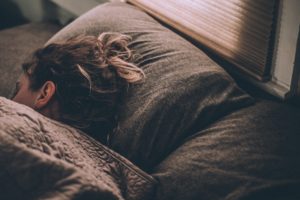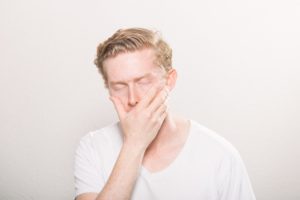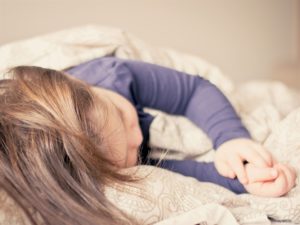Category: news
The content you have given does not include any specific text for rewording but rather outlines the framework for a webpage section created using the Divi Builder, which is a tool for building pages in … Read more
The content you have given does not include any specific text for rewording but rather outlines the framework for a webpage section created using the Divi Builder, which is a tool for building pages in WordPress. What you’ve provided describes the layout for a section, a row, and a column, which then leads to a text module. This is not actual textual content that can be reformulated. If you have any real text that requires rephrasing, kindly submit the text without including the HTML or Divi Builder’s shortcode, and I would be glad to help with your request.
A study carried out by Rice University, and Northwestern University has indicated that individuals who have recently lost a partner have a higher risk or experiencing sleep disturbances that may particularly bad for their heart. Grief leads to sleep disruptions that aggravate levels of inflammation in the body and increase the risk for cardiovascular illness.
The study is a part of a much larger project called HEART, and its results were published in Psychosomatic Medicine. In this research, scientists have compared analyzed the sleep habits and sleep disturbances of recently widowed people. Results of the study indicate that sleep disturbances and inflammation were 2 to 3 times higher in recent widows and widowers. The level of inflammation in the body was measured by measuring the levels of proinflammatory cytokines. Proinflammatory cytokines are well-known as short-term fighters of a disease, but they are also linked to long-term risk for severe health problems such as heart disease.

One of the authors of the study, Diana Chirinos, an assistant professor of preventive medicine at the Northwestern University Feinberg School of Medicine, started exploring this topic in her postdoctoral studies at the Rice Academy, and found out that bereaved individuals are overall more affected by the negative effects of poor sleep than people who are not grieving at the moment. The death of a spouse is as a very stressful event and requires a lot of time and emotional strength in order to be handled. It is entirely reasonable to experience sleep disturbances at that time. However, poor sleep is another major stress for the body. When you add poor sleep to an already stressful situation, you are doubling the stressor. As a result, your immune system will become over-activated and raise the levels of proinflammatory cytokines in your body.
Some studies in the past already showed that widowed people had higher levels of inflammation in their body and revealed that they are at a 41% higher risk of mortality. However, an interesting fact is that 53% of this increased risk is due to heart disease. Diana Chirinos and her fellow researchers wanted to identify the specific cause. This study has shown that grief is not the primary cause of this increased risk, but the sleep disruptions that arise from that grief.
Chris Fagundes, the principal investigator for Project HEART, said that this study is very important because it reveals how human activities and certain behaviors affect inflammation and how grief can impact our health. Further research aims to help come up with effective health interventions for those who have recently experienced a loss.
[/et_pb_text][/et_pb_column][/et_pb_row][/et_pb_section]
A new study, engaging 177,000 young learners, carried out by the American Academy of Sleep Medicine, has identified a link between a lack of adequate sleep in kids and teenagers, and a detrimental way of … Read more
A new study, engaging 177,000 young learners, carried out by the American Academy of Sleep Medicine, has identified a link between a lack of adequate sleep in kids and teenagers, and a detrimental way of living that includes poor dietary choices and heightened usage of digital screens.
The results of the study specifically link improper sleep with unhealthy eating habits such as skipping breakfast, fast-food consumption and consuming sweets on a daily basis. Poor sleep is also associated with increased screen time and being overweight or obese. The results were published in the October issues of the Journal of Clinical Sleep Medicine.

The senior author of the study, Labros Sidossis, Ph.D. at the Department of Kinesiology and Health at Rutgers University in New Brunswick, New Jersey, says that 40% of children in the study slept significantly less than recommended. Sleep experts at the American Academy of Sleep Medicine recommend that children aged from 6 to 12 must sleep 9 to 12 hours per night on a regular basis. Teenagers aged 13 to 18 require 8 to 10 hours of sleep per night. Sleeping less than the recommended amount may jeopardize children’s health. Poor sleep and bad sleeping habits were linked to poor dietary habits, obesity and increased screen time in both genders.
The participants of the study were required to complete electronic surveys at school which included providing information on their dietary habits, typical sleeping hours, physical activity, and sedentary activities. The participants of the study were children aged from 8 to 17. The results of the study show that children and teens who reported sleep less than 9 or 8 hours per night also had lower physical activity. Their physical education teachers obtained physical activity status and anthropometric fitness measurements.
Dr. Sidossis was surprised that aerobic fitness was associated with children’s sleep habits. Simply explained, better sleep habits are associated with higher levels of aerobic fitness. Since adequate sleep results in higher energy levels during the day, researchers believe that kids who sleep well are more physically active during the day. Poor sleep among school-aged children is a severe health problem in Westernized societies, and all findings aim to help parents, teachers and health professionals to identify particular sleeping problems and successfully promote strategies that will encourage healthier sleeping patterns and better sleeping habits.
Recent research has revealed that the mechanism which regulates sleep in fruit flies includes a component often found in energy drinks. Intriguingly, fruit flies exhibit a number of similarities to humans. They are active during … Read more
Recent research has revealed that the mechanism which regulates sleep in fruit flies includes a component often found in energy drinks. Intriguingly, fruit flies exhibit a number of similarities to humans. They are active during the day and rest at night, just like humans, and they show sleep behaviors that are remarkably similar to those observed in humans. The research carried out at the Florida Atlantic University identified a new gene and the way it controls sleep in fruit flies through the regulation of taurine – an ingredient frequently present in energy drinks. Taurine also plays a significant role in the human brain, where its concentration rises in the blood and urine of people who are sleep deprived.

Every individual is aware of the importance of sleep for our physical and mental wellbeing. Rest is vital for immune function, metabolism, brain and muscle repair, learning and memory. Unfortunately, 30% of people will experience a sleep disorder throughout their life. All sleep disorders, no matter how harmless they seem, should be taken seriously because they are associated with a number of severe diseases such as diabetes, cardiovascular disease, and obesity.
In the past, scientists have believed that the glial cells only support neurons within the brain. However, new studies have revealed that these cells are essential for sleep regulation. The research teams of Florida Atlantic University and McGill University in Quebec had studied the fruit fly and discovered that glial cells and their ability to manage taurine are vital for regulating sleep. The fruit fly was chosen because it shares 75% of genes that cause various illnesses in humans, and although because we display similar behavioral and physiological characteristics of sleep. The study aimed to identify new genes that affect sleep and wakefulness in fruit flies. Scientists have uncovered a gene that is responsible for the membrane transport protein. This gene is called excitatory amino acid transporter 2 or shortly Eaat2.
Eaat2 increases wakefulness in fruit flies and actually limits their length and intensity of sleep. Sleep is regulated by controlling the movement of taurine into the glia. We already know that taurine is elevated in the blood and urine of sleep-deprived individuals, but we don’t know if taurine levels change after sleep deprivation. The authors of the study also found that disruption of Eaat2 in fruit flies causes excessive daytime sleepiness.
Since more than 70 millions of Americans suffer from sleep disorders, this kind of research is essential to raise awareness of the importance of sleep deprivation as a global issue and about understanding the fundamental mechanism of sleep. The identification of Eaat2 as a sleep regulator will help scientists to study further sleep regulation, sleep disorder treatment, and changes in metabolism that depend on sleep.
The scientists found that Eaat2 works only in specific glial cells of the fly brain. Glial cells play an important regulatory role and don’t just control the wakefulness of the fly, but also circadian rhythms. As mentioned before, Eaat2 regulates sleep by transporting taurine. Increased levels of taurine in the brain lead to excessive daytime sleepiness, and this claim was confirmed by an individual experiment which involved feeding fruit flies taurine. Future research aims to discover how transport of taurine to and from glial cells affects sleep in humans.
Recent research underscores the critical role of good sleep practices in mental health. Experts in medicine and science have identified links between sleep disorders and a range of mental health issues, such as anxiety, depression, … Read more
Recent research underscores the critical role of good sleep practices in mental health. Experts in medicine and science have identified links between sleep disorders and a range of mental health issues, such as anxiety, depression, dementia, and brain injuries. Previously, these sleep problems were often considered just symptoms of pre-existing mental health conditions, yet today’s findings suggest that poor sleep can actually exacerbate neurological disorders. This information comes from research presented by the Society for Neuroscience during their yearly gathering on November 5th, 2018. The Society for Neuroscience is renowned as a leading and extensive source for news related to neuroscience and mental health.

The study aims to understand better the brain mechanisms linked to disrupted sleep and irregular circadian rhythms, and hopefully, discover new ways to prevent and alleviate disorders that are affected by irregular circadian rhythms such as anxiety, depression, Alzheimer’s and dementia. Even though scientists still don’t have a clear understanding of how sleep exacerbates certain brain disorders, the research emphasizes the importance of prioritizing healthy and regular sleep.
At the annual meeting of the Society for Neuroscience, researchers have, among other topics, studied and presented the impact of concussions after more extended periods of sleep deprivation, and found out that brain injuries negatively affect circadian rhythms. The brain mechanisms which may worsen anxiety in sleep-deprived individuals were also presented. More research has to be conducted, but studies so far indicate that deep slow-wave sleep is required to calm the overactive regions of the mind. Lastly, neuroscientists have discovered that astrocytes, a circadian clock gene, play an important role in Alzheimer’s pathology. Disruption of the circadian rhythm on a cellular level can lead to neuroinflammation and exacerbate mental disorders such as Alzheimer’s.
Among other findings, all studies presented at this year’s annual meeting help us understand why sleep is disrupted in so many patients suffering from mental or brain issues. Treatments that regulate circadian rhythms, such as sleep-focused therapies may be beneficial in preventing a number of brain disorders, including Alzheimer’s disease and anxiety. This furthermore emphasizes the vital role of sleep for our physical and mental wellbeing.
Considering the significant amount of time teenagers devote to digital gadgets such as computers and smartphones, anxiety has heightened among parents, guardians, and policymakers regarding the effects of these digital activities on personal health. Earlier … Read more
Considering the significant amount of time teenagers devote to digital gadgets such as computers and smartphones, anxiety has heightened among parents, guardians, and policymakers regarding the effects of these digital activities on personal health. Earlier studies have demonstrated that insufficient sleep affects 50 to 90% of school-aged children, attributing this issue to the use of technology and excessive exposure to screens. However, new research from the University of Oxford‘s Oxford Internet Institute suggests that the amount of time spent in front of screens might have little to no effect on the sleep quality of young individuals.

The research was conducted by examining data collected from the United States’ 2016 National Survey of Children’s Health and published in the Journal of Pediatrics. In this survey, parents have provided lots of information about themselves, their children and household. The findings indicate that there is no significant relationship between sleep and children’s screen-time.
A link between screen time and sleep in children exists, but it’s simply too small to make a difference in kids’ sleep. Even 8 hours of screen time a day doesn’t make a significant impact on school-aged children’s sleep. Other known factors, such as early morning classes have a more significant impact on sleep. The analysis in the study indicated that family habits and household surroundings are associated not only with sleep outcomes but also with the amount of screen-time a child spends every day. Dr. Przybylski, the lead author of the study, emphasizes the importance of focusing on bedtime routines and regular sleep patterns for healthy and undisturbed sleep. Overall, he claims implementing healthy sleeping habits is more efficient for getting proper rest on a daily basis than thinking being exposed to screens themselves disrupts sleep.
This study aims to provide parents with a realistic foundation for looking at the impact of electronics and screen time on sleep, and to compare them with other interventions on sleep. Further studies will try to identify the mechanisms that link digital screens to sleep. Researchers will specifically be examining technologies that emit blue light that has been linked to many sleep problems. However, although there are studies that indicate blue light might disturb sleep, there is still no clear evidence that it plays a significant causal role. Since technology such as computers, TVs, and smartphones are here to stay, it’s vital for scientists to conduct research and find out how all that tech actually affects us, and the best ways to limit its harmful effects.
A new research article in the Journal of Sleep Research suggests that the age-old advice of “sleeping on it” when facing a decision is indeed sound guidance. This study suggests that a daytime nap can … Read more
A new research article in the Journal of Sleep Research suggests that the age-old advice of “sleeping on it” when facing a decision is indeed sound guidance. This study suggests that a daytime nap can help people process information that isn’t immediately clear to the waking mind. The study observed participants’ brain activity and responses before and after they took a short nap. The results indicate that a brief period of sleep helps people better weigh the pros and cons when dealing with difficult decisions.

The study was conducted at the University of Bristol, and the Medical Research Council founded it. The study aimed to identify whether short sleep can help us process unconscious information, and how that affects our behavior and reaction time. The results reveal a significant benefit of day-time naps on cognitive brain function and suggest our mind can process information that we are not consciously aware of during those naps.
Previous studies showed that sleep helps with problem-solving. However, it’s not clear if some kind of mental process is required before or during shuteye in order for sleep to help problem-solving. Researchers have noticed that our brain processes information at a subliminal level within the mind, to the extent the entire process is not conscious. The electrical activity naturally produced in the brain was measured using an EEG before and after a nap, and the results suggest that sleep (not the state of wakefulness) improves processing speed in tasks where information is hidden or hard to grasp. Rest doesn’t enhance processing speed in simple, control tasks, etc.
We already know that sleep positively affects the process of acquiring knowledge and recall of information, and we also know that snoozing improves and strengthens our memory. However, from this study, we can also conclude that naps and sleep can also improve our responses and help us to process information faster. Dr. LizCoulthard from the University of Bristol Medical School announced further research that will aim to study larger samples and find out more about the underlying neural mechanisms. Researchers are also interested in finding out see if and how the results differ between ages.
Researchers at the Bloomberg School of Public Health at Johns Hopkins University have recently concluded a study showing that higher instances of daytime sleepiness are associated with an increased risk of Alzheimer’s disease in the … Read more
Researchers at the Bloomberg School of Public Health at Johns Hopkins University have recently concluded a study showing that higher instances of daytime sleepiness are associated with an increased risk of Alzheimer’s disease in the future. This comprehensive study analyzed data collected from senior citizens, finding that those who suffer from excessive daytime sleepiness are nearly three times as likely to have brain deposits of beta-amyloid. This brain protein, associated with memory loss, is a key marker for Alzheimer’s disease.

The results of the study were published in September 2018 in the journal SLEEP. This study contributes to other evidence that poor sleep encourages the development of dementia, and also indicates that proper and regular rest may help prevent Alzheimer’s disease.
Dr. Spira, Ph.D., associate professor in the Department of Mental Health at the Johns Hopkins Bloomberg School of Public Health, says that factors such as diet, exercise, and cognitive activity severely contribute to the development of Alzheimer’s. The results of their study indicate that poor sleep may contribute to Alzheimer’s disease just as above mentioned factors. Therefore, treating sleep issues may also help avoid these adverse long-term outcomes.
The study used data from a long-term study that started in 1958 and has gathered sleep data about thousands of volunteers. As part of the study, volunteers had to fill a questionnaire between 1991 and 2000 and answer yes or no to the following questions:
- Do you often feel drowsy or fall asleep during the daytime when you want to be awake?
- Do you nap?
- How much do your nap? (daily, 1-2 times a week,3-5 times a week, rarely or never)
In 1994, some participants also received neuroimaging assessments. In 2005 some subjects received PET scans by using PiB (Pittsburgh compound B). PiB can identify beta-amyloid plaques in neuronal tissue, also known as an early sign of Alzheimer’s disease.
The scientists were able to identify 123 participants of the study who answered the earlier questions and had a PET scan with PiB 16 years later. This data was analyzed again to see if there was any correlation with their napping habits or daytime sleepiness, and they found out all 123 participants were positive for beta-amyloid deposition in their brains.
After adjusting the demographic factors that could influence daytime sleepiness, the results showed that people are sleepy during the day are 2.75 times more likely to have a beta-amyloid deposition in the brain than those who don’t.
Scientists still don’t know how daytime sleepiness is associated with the deposition of beta-amyloid protein. Most likely, sleepiness somehow triggers this protein to form in the brain. It’s even possible that the amyloid plaques were present at the time of sleep assessment, and that they are the ones that cause the sleepiness.
Since there is still no cure for Alzheimer’s, we have to do our best to prevent it. If prioritizing is one of the ways to prevent or slow down this severe condition, then we should definitely focus on getting more quality rest.
Researchers at Penn State have discovered through their study on the sleep habits of children aged 5 to 9 that kids get less sleep when their mothers face strict working hours or have little flexibility … Read more
Researchers at Penn State have discovered through their study on the sleep habits of children aged 5 to 9 that kids get less sleep when their mothers face strict working hours or have little flexibility in their job timings. On the other hand, children experienced longer sleeping periods when their mothers’ jobs allowed for more schedule flexibility. Although it is widely recognized that working moms often have difficulty securing enough rest time, the idea that their strict work schedules could detrimentally impact their children’s sleeping patterns was not as expected.
However, after further research was carried out scientists have found that working tight schedules impairs children’s sleep only in those who don’t have a regular bedtime routine. Having a consistent bedtime routine may solve this problem.

Orfeu Buxton, professor of bio behavioral health at Penn State says that the results of the study suggest that this problem emerges due to inconsistent bedtime routine. We definitely know that bedtime routines and promoting healthy sleeping habits is very important for positive child growth and healthy sleep, so if a quality bedtime routine is missing, sleep will probably suffer too. The results of the study were published in the Journal of Child and Family Studies. Researchers who carried out the study also suggested that creating policies that give employees more flexibility would be very helpful for the health both of the employed mothers and their kids.
Soomi Lee, one of the researchers who carried out the study and currently an assistant professor at University of South Florida, suggest employers begin by considering how to change both the structural and cultural practices that may impair work flexibility. Taking measures such as flextime, telecommuting, or job-sharing with another employee would be very helpful for increasing working mothers and employees’ flexibility.
Helping your kid to develop a regular bedtime routine is vital for their long-term growth and development. The study was carried out by analyzing data gathered from 1,040 mothers and their children. In the study, only children aged from 5 to 9 were considered. Each mother was also asked if their child has a regular bedtime routine, how many hours their child usually slept, and if it has any sleep problems. After analyzing the data, the researchers found that poor workplace flexibility was associated with shorter sleep time in children. An increase in workplace flexibility was linked with kids sticking to their sleep routines better and having almost 50% less chance to experience sleep troubles.
In order to solve this problem, researchers and clinicians suggest speaking with working mothers about how to improve their children’s bedtime routines. Further research aims to identify other factors linking to mother’s and father’s work hours and child sleep, how to promote healthy sleep habits from childhood, and how to decrease future sleep health imbalances.
A new study by researchers from the American Academy of Sleep Medicine has shown that insomnia treatment can affect people with fibromyalgia by slowing down or possibly reversing the decrease in cortical gray matter. Preliminary … Read more
A new study by researchers from the American Academy of Sleep Medicine has shown that insomnia treatment can affect people with fibromyalgia by slowing down or possibly reversing the decrease in cortical gray matter. Preliminary outcomes suggest that around eight weeks of cognitive-behavioral therapy for insomnia, known as CBT-I, could have an impact on the central nervous system’s structure by slowing or even possibly reversing the loss of cortical gray matter in patients suffering from fibromyalgia alongside.

From the study published in the Journal of Clinical Sleep Medicine, we found out that patients that have received CBT-I developed cortical thickness during and after the treatment, while the patients who were in the control group developed thinning of the cortex. Researchers also tried cognitive behavioral therapy for pain (CBT-P) but failed to produce the same or similar results as with cognitive-behavioral therapy for insomnia. CBT-P seemed to slightly reduce cortical atrophy, while CBT-I increased cortical thickness.
The study was conducted by analyzing data from a larger clinical trial about the efficacy of CBT-I and cognitive behavioral therapy for pain for fibromyalgia and insomnia. From 2009 to 2012, participants were used for a parent study, and some of them also underwent MRI before and after eight weeks of treatment. 37 patients were assigned to CBT-I, CBT-P or to a control group and interventions lasted for 8 weeks. The therapy consisted of 50-minute sessions with a trained therapist where patients were educated about sleep hygiene, stimulus control, autogenic relaxation, sleep restriction and similar. CBT-P consisted of pain education, how to do progressive muscle relaxation, visual imagery relaxation and so on.
The lead author of the study Christina McCrae concluded that CBT-I can reverse or resolve pain-related, neural plasticity and has essential implications for chronic pain sufferers. McCrae will also research the treatment of chronic pain using cognitive behavioral therapy for chronic insomnia, and particularly focus on improving sleep in women with fibromyalgia by promoting positive changes in how the brain processes and responds to pain.
Sleep Music And Sleep Meditation Offer An Incredibly Easy Way To Get The Deep Sleep You Crave. If You Have Been Struggling To Get To Sleep Easily, Or Just Need To Get Deeper Better Quality … Read more
Sleep Music And Sleep Meditation Offer An Incredibly Easy Way To Get The Deep Sleep You Crave. If You Have Been Struggling To Get To Sleep Easily, Or Just Need To Get Deeper Better Quality Sleep, Then Along With Having A Good Bed To Sleep On, Getting A Relaxed Mind At Bedtime Is The Key You Need.
Jump into a place where tunes rock you to sleep like magic. **Music for sleep** wraps your mind, leading you softly into dreamland. Why count sheep when melodies can carry you off? This magical journey offers slumber with just a click. Dive deeper to discover the wonders of sleep tunes.
Sleep meditation, often using deep relaxation music in the background, requires a little more focus. It does however help you, get into an amazingly deep sleep, even when feeling stressed.
Having the right bed, the right mattress especially, is critical to getting the sleep you need at night. Having your mind in the right zone for sleep, being well relaxed and at ease is also vitally important though.
When you create a great environment for sleeping, through using a properly supportive, comfortable bed, along with the other sensory conditions that induce quality sleep. Then you are set for getting the rest and restoration you need with ease.
Relaxation is the key to good deep sleep.
Counting Sheep is here to help you get that properly deep relaxation.
Deep Sleep With Ease How To Get Truly Relaxed And Get To Sleep Fast
Knowing that relaxation is the key to the sleep you need, gets you halfway to being able to sleep properly every night.
Knowing that sleep music and sleep meditation help you to get that deep relaxation before sleep, or after you have turned the lights off and settled in bed for the night. Gives you the ability, to actually do something to ensure you get that much needed deep sleep.
Fast too.
Even if you suffer from insomnia.
Calming music, and relaxing bedtime meditation, soothe your mind. And your body. Into a state where you can sleep with ease.
So realistically you are learning how to get to sleep fast, and how to get deep sleep with ease. At the same time.
And this is so much more than learning. There are amazing resources you can get which make deep sleep easy for you to enjoy. Every night.
Sleeping Well Helpful Tips From Counting Sheep On Sleep Music And Getting Deep Sleep
- Sleep Music And Sleep Meditation How To Get Deep Sleep With Ease
- Relaxing Sleep Music The First Easy Step To Enjoying Easy Deep Sleep
- Sleep Meditation How To Get To Sleep Fast A Really Deep Sleep Too
- Recommended Soothing Relaxation Sleep Music And Sleep Meditation From SurgingLife
- Sleep Music And Sleep Meditation Getting Even Better Results For Deeper Sleep
It is really worth your time getting the deep sleep tips and advice below.
Getting a really good relaxing sleep is far easier than you may think. As long as you follow these tips, and allow the relaxing sleep music, or wonderful deep sleep meditation, to carry you off. Into that blissful sleep that you want so much.
Relaxing Sleep Music The First Easy Step To Enjoying Easy Deep Sleep
Relaxing sleep music is the first simple step to bringing yourself into a beautiful relaxing state of peaceful calm.
There is actually very little for you to do.
Just lie back. Slide into the deep comfort of your bed. Allow your head to rest deeply on your pillow.
Letting the peaceful, soothing music to just flow in through your ears. And the calm melodies and relaxing music to carry you into deep relaxation. Into sleep. Do know, sleep music has been clinically shown to help improve sleep quality for people with insomnia.
Soothing Music To Sleep To Making Sure The Sleep Music You Choose Is Right
Of course, getting the right sleep music is the key thing.
With a huge variety of tracks, and types of sleep music available, knowing what is going to generate the best effect is very important. After all, you do want the best, deepest, sleep, that you can get. Right?
While some people opt for soft piano music, the sound of piano keys can be far from relaxing to others.
Equally well, what some people think of as relaxing celtic music, can be far from restful for others.
There are certain music types which bring relaxation to everyone though.
The type of relaxation that takes over, and you slip into deep calm. Deep relaxation. Without even thinking, or even realizing, that time has passed. It is like you have just suddenly dropped down, into that blissful state of peaceful calm.
That is the type of relaxing music you really want to use at bedtime.
It is easy to get too.
Deep Sleeping Music That Uses Brainwave Entrainment To Really Relax You Into Sleep
You have various states that your brain works in. Each state has a certain range of brainwave frequencies that go with it.
In really deep sleep your brain is in the delta brainwave range.
So having relaxing sleep music with delta brainwave frequencies in, does a huge amount to help you get into a deeply calm state. To get you into that peaceful deep sleep that feels so good.
Binaural Beats, Isochronic Tones, Monaural Beats And Delta Brainwaves For Sleep
There are three types of sounds used for brainwave entrainment. They are binaural beats, isochronic tones and monaural beats. Each of them have their advantages, and situations in which they are most useful.
Binaural Beats And Getting Into The Delta Brainwave State
Binaural beats are the most commonly known.
However, binaural beats are only really useful in the upper brainwave states of gamma and beta. Neither of which are relaxing, and both of which can feel very stressful. Plus you have to wear headphones if you are to get any effect from them.
Isochronic Tones Flexibility And Deep Relaxation Come To You
Isochronic tones are incredibly useful as their effects can be enjoyed through either speakers or headphones. Something which is very useful if you are going to sleep. Being able to use speakers saves you from getting wrapped up in wires!
Isochronic tones are best in the alpha, mildly relaxing, and theta, deeply relaxing, states.
Peaceful Deep Sleep Thanks To Monaural Beats And Delta Brainwaves
Monaural beats however are best for the delta brainwave range.
Monaural beats as with isochronic tones can be enjoyed fully through either speakers, or headphones. Giving you flexibility and choice. So at home you can enjoy sleep music that uses them through speakers. Then while traveling, especially when flying, you can get great effect from them through your headphones.
Great hey.
When you have good sleep music that uses delta brainwave frequencies, driven by monaural beats, you will be amazed how easily, and how deeply you can get to sleep.
This combination truly brings an amazingly peaceful sleep induction.
That will have you fall asleep so fast.
You can find a highly recommended source for relaxing sleep music below. You can also carry on through. And discover another amazing way to get an amazing night of peaceful deep sleep, with amazing ease.
Sleep Meditation How To Get To Sleep Fast A Really Deep Sleep Too
Meditation as you have likely heard is a great way to relax.
When you can focus your mind properly on relaxing that is.
That is why guided meditations have become so popular. They make it easy for anyone to enjoy a really deep and peaceful meditation.
Meditation just before bed is a really good thing to do. Many meditation teachers recommend doing meditations first thing in the morning, just after you wake up. When you are still in that blissful, hazy state of calm.
Plus last thing at night either before, or when you go to bed.
By enjoying a really peaceful meditation just before you go to sleep, you can release all the tension and stress that you had from your day. So your mind is clear and at ease.
Ideal for getting quality sleep.
That is where sleep meditation comes in. It is a meditation that is optimized, to help you get the quality deep sleep your mind and body need each night.
Sleep meditation is a really good way to improve sleep quality. Notably your mind becomes far less active when you’re asleep. Your mind actually becomes calm. So sleep problems can become a thing of the past.
Insomnia, Sleep Problems And How Using A Guided Sleep Meditation Helps You Sleep Well
Insomnia as with many sleep problems, is stress related.
The more stress you have, the harder your mind finds it to relax. Because of this, being able to fall asleep, and stay asleep too, becomes an issue. Hence sleep problems and sleepless nights.
But it is so easy to relax your mind properly, and get into a peaceful stress free state that lets you fall asleep easily.
Guided sleep meditation is what makes it easy for you to fall asleep. Properly.
Just imagine.
Your mind. Totally relaxed. And, all your muscles. Totally relaxed too. Your whole body, calm, at ease. As you slip into a deep, deep sleep.
Just drift with total ease. Feeling calm, and peaceful. Into sleep.
That is what a good guided sleep meditation helps you to enjoy. And all you do is press play. Listen. Follow the voice. And fall asleep with it. So easy.
Guided Sleep Meditations Use Ones That Have Beautiful Relaxing Music In
Of course, just a voice on its own would be unusual.
Most guided sleep meditations come with a background of beautiful relaxing music. Basically because that music drifting along in the background, just helps you to relax into sleep even more.
This is something that can make sleep meditation even more powerful than pure sleep music.
With a good guided sleep meditation you are mixing the guidance of a meditation master, with the power of relaxing music. Getting a synergy from the two things. Making the result even more powerful.
Basically, it helps you to relax and fall asleep much more effectively.
Which has got to be a good thing for you.
Delta Wave Music Combined Within Your Guided Sleep Meditation For Really Deep Sleep
As mentioned earlier on in the sleep music tips on what to get to help you get deeper sleep. Delta wave music will help you get your brainwaves into that really peaceful delta brainwave state.
Delta is the deepest state your mind can go into.
With deep dreamless sleep being what you get there.
Delta brainwaves can be difficult to access for a lot of people. Unless they do meditation on a regular basis. Why?
Most people have little practice with getting their brain to become truly calm.
So having someone to guide you in a peaceful way, into deep relaxation. While at the same time you are also listening to music, running in the background of the meditation. Which has been specifically created and optimized, to help you to gently slide, with even more ease, down into that beautiful relaxing sleep you desire.
Wow, what a combination that is.
This is what your mind really needs if you have sleep problems. Even if you are finding deep sleep a challenge, because you are generally a light sleeper.
This combination of a guided sleep meditation, with delta wave brainwave entrainment flowing through the carefully matched background sleeping music.
Is exceptionally powerful.
Delta Wave Sleep Brings Huge Health Benefits Too With Stress Gone And Healing Improved
As an added benefit, delta wave sleep is incredibly beneficial to your health from a healing point.
While you sleep your body does most of its healing and restoration. Bodily tissues are replaced, and any injuries get more focus healing-wise from the body.
In delta wave sleep these effects, have been noted to the greatest degree.
So helping yourself to get into delta wave sleep on a regular basis, does have good health benefits.
Plus, when you are going into the delta brainwave state on a regular basis you are going to be enjoying plenty of stress release. To get into the delta wave state you have to let go of stress. And stress happens to be a major factor in most sleep problems.
When you are regularly releasing stress. Which both the sleep meditation, and background delta wave music will help you with.
Your life is going to feel much sweeter too.
Just feel it now. That sense of letting go of the stress in your life.
Feels good.
These are just some of the advantages to using a guided meditation for sleep. Especially one with good delta wave sleep music flowing along gently in the background. If you want to know more about the benefits of meditation, and brainwave entrainment. Please to go to SurgingLife, as they have some great resources and information that can help you.
For now you will likely wish to know the recommended sleep meditation so you can start enjoying deep sleep tonight!
Recommended Soothing Relaxation Sleep Music And Sleep Meditation From SurgingLife
To help you get really good quality, deep sleep, there are a couple of resources that are recommended. Alongside having a really comfortable bed to sleep in of course!
Both these resources have been created by Stephen Frost the founder of SurgingLife.
Why Recommend Resources From SurgingLife? Because They Do Produce Beautiful Relaxing Results
SurgingLife is a brand that shares a huge amount of information that helps with wellness. They also have a stack of great resources to help people get the best of their life, and their health.
So their sleep music, relaxation music, guided meditations and everything else have been very carefully crafted to get you great results.
In this case, really good peaceful sleep.
Sleep Music With Delta Wave Entrainment “Peaceful Sleep Induction”
 The “Peaceful Sleep Induction” from SurgingLife was specially designed to help you fall asleep fast. And then take you down into deep sleep quickly too.
The “Peaceful Sleep Induction” from SurgingLife was specially designed to help you fall asleep fast. And then take you down into deep sleep quickly too.
With the peaceful rhythms flowing along, and the delta wave music too.
Your mind just gently slips away into sleep in a really beautiful way. Experience it and you will feel how wonderful it truly is.
Delta Wave Guided Sleep Meditation From SurgingLife
 To help you go even deeper, and help you to release stress and enjoy a really amazing night’s sleep.
To help you go even deeper, and help you to release stress and enjoy a really amazing night’s sleep.
The delta wave guided sleep meditation from SurgingLife, guided by Stephen Frost, with a background of very peaceful relaxing sleep music. All put together in a way that has that has you fall asleep, fast and deep into that relaxing deep sleep that does you so much good.
Get the delta wave guided sleep meditation from SurgingLife.
Sleep Music And Sleep Meditation Getting Even Better Results For Deeper Sleep
There are some things you can do to ensure the best results from both your sleep music, and your peaceful sleep meditation.
First up, absolutely has to be have a really good quality mattress.
One which is both properly supportive, and comfortable. This is going to help you to relax both your body and your mind in a really important way. Plus the sleep you will get will be truly refreshing, as your body will feel good when you wake up in the morning.
Second, using good quality lavender essential oil.
Some people love it, others less so. It has been shown time and again to help with relaxation and sleep though. And for centuries it has been used as a sleep aid. So having an aroma diffuser, with good quality, pure, natural lavender essential oil, can help you get even more relaxed. And thus get good deep sleep.
Match these, and our other simple bedtime sleep tips, with the recommended relaxing sleep music, or the peaceful sleep meditation, and you will be set for a winning night’s sleep.
Every night you choose to get deep sleep.
Sleep Music And Sleep Meditation A Final Tip We Recommend
Whether you are listening to the soothing relaxation guided sleep meditation, or the beautiful “Peaceful Sleep Induction” sleep music.
We recommend using good stereo speakers, and a music player with a sleep function.
That way, after starting which track you choose to use for the night, the player and speakers will turn off automatically. So leaving your room truly peaceful for the best results.
Other than that, check through the SurgingLife store at https://store.surginglife.com, and use the special CountingSheep.Net coupon code “CountingSheep” to get a 10% discount on whatever sleep music, sleep meditation, relaxing music, guided meditations or whatever you wish to enjoy. And enjoy the beautiful deep sleep that comes as a result of having taken action, and having the relaxing sleep music, or guided meditation, to help you fall asleep fast, and deep.